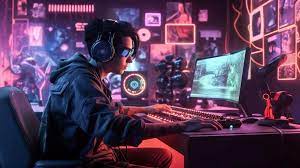In the world of gaming, change is constant. The video game industry is always evolving, driven by technological advancements and changing player expectations. In this article, we'll explore some of the emerging trends and technologies that are shaping the future of game development.
Virtual Reality (VR) and Augmented Reality (AR)
Virtual Reality and Augmented Reality have been buzzwords in the gaming industry for a while, but they continue to evolve. VR immerses players in entirely virtual worlds, while AR enhances the real world with digital elements. Games like "Beat Saber" and "Pokemon Go" have shown the potential of these technologies.
VR headsets are becoming more accessible and affordable, and AR applications are expanding beyond mobile devices. Game developers and VR development companies are exploring innovative ways to incorporate VR and AR into gameplay, offering players immersive experiences like never before.
Cloud Gaming
Cloud gaming is changing how we access and play games. Services like Google Stadia, Xbox Cloud Gaming, and NVIDIA GeForce NOW allow players to stream games from remote servers, eliminating the need for powerful gaming hardware. This makes gaming more accessible to a broader audience.
In the future, we can expect improvements in streaming technology, reduced latency, and a growing library of games available for streaming. Cloud gaming has the potential to revolutionize the industry by making high-quality gaming experiences available on a wide range of devices.
Artificial Intelligence (AI)
AI is playing a significant role in game development. Game developers are using AI to create more realistic non-player characters (NPCs) and to enhance the gameplay experience. AI-driven procedural content generation is also being used to create vast, dynamic game worlds.
In the future, AI could be used to personalize gameplay experiences, adapt difficulty levels in real-time, and even create entirely new game levels and scenarios based on a player's preferences and behavior.
Blockchain and NFTs
Blockchain game development is introducing a new concept to the gaming world. It involves something called Non-fungible tokens (NFTs), which are special digital items representing in-game stuff like items, characters, or even whole game worlds. Players can buy, sell, and trade these digital items, creating a fresh way to own and value things in the gaming world.
Blockchain technology can also boost security and honesty in the gaming business, making it harder for people to cheat or commit fraud. Although this technology is still new in gaming, it has the potential to change how we view and manage in-game assets and economies.
Realistic Graphics and Ray Tracing
Graphics technology continues to advance, delivering more realistic and immersive visuals. Ray tracing, a rendering technique that simulates how light interacts with objects in a scene, creates stunningly lifelike environments and reflections.
High-end gaming hardware is already incorporating ray tracing capabilities, and as technology becomes more accessible, we can expect even mid-range devices to deliver impressive graphics. Realistic graphics not only enhance visual appeal but also contribute to storytelling and immersion.
Cross-Platform Play
Cross-platform play is becoming the norm, allowing players on different devices and platforms to play together. Games like "Fortnite" and "Minecraft" have popularized this trend.
In the future, we can anticipate more games embracing cross-platform play, creating larger and more diverse player communities. This trend encourages inclusivity and fosters a sense of unity among gamers.
Accessibility and Inclusivity
Game developers are increasingly focusing on making their games accessible to a wider audience, including players with disabilities. This includes customizable controls, subtitles, and options for players with different needs.
In the future, we can expect continued efforts to ensure that everyone can enjoy gaming, regardless of their physical or cognitive abilities.
Sustainability and Eco-Friendly Initiatives
As environmental concerns become more prominent, the gaming industry is taking steps to reduce its carbon footprint. Game developers are exploring eco-friendly practices, such as energy-efficient game servers and sustainable packaging.
In the future, we may see more games integrating themes of environmental consciousness into their narratives and gameplay mechanics.
Conclusion
The future of game development is an exciting one, filled with technological innovations and trends that promise to reshape the gaming landscape. Virtual Reality, Cloud Gaming, Artificial Intelligence, Blockchain, Realistic Graphics, Cross-Platform Play, Accessibility, and Sustainability are just a few of the key areas where we can expect significant advancements. These trends will not only change how games are developed but also how players experience and interact with the digital worlds they love. As technology continues to evolve, so too will the possibilities in the world of gaming.


No comments yet